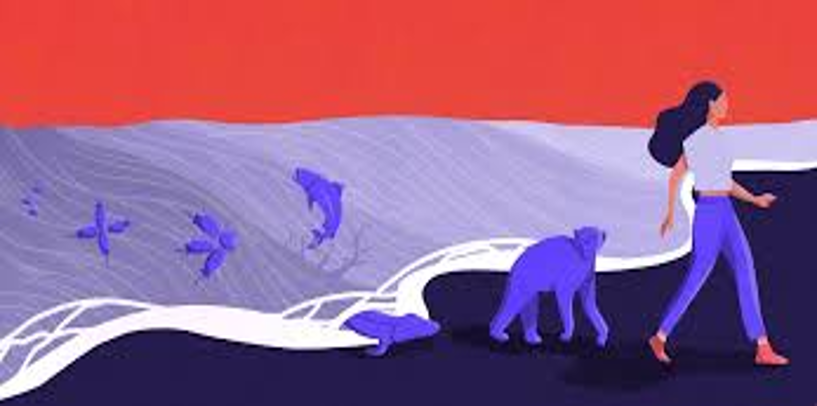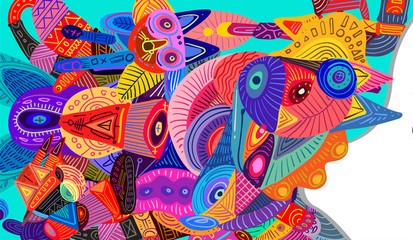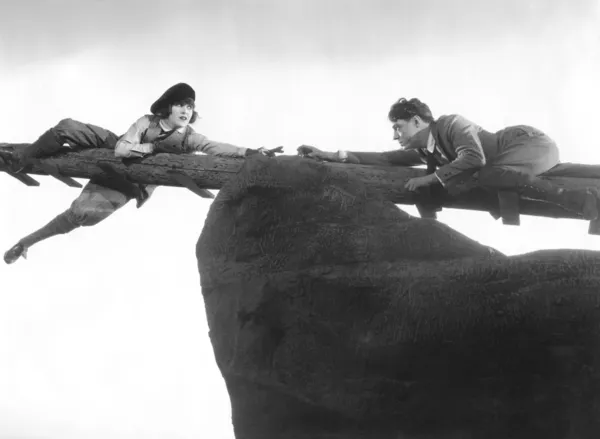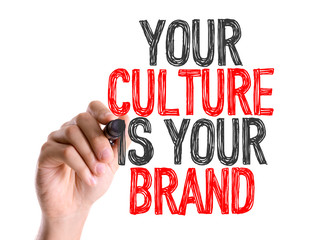
(Author's Note: This post is a slightly different version of one that I posted on the Americans for Humanity website, https://americansforhumanity.net/cultural-evolution. That version introduces its section on Cultural Evolution under a more moderate title: "Introduction to Cultural Evolution." I use the word "definitive" here because I am very convinced culture is the primary driver of the human species, not because my interpretation is in any way definitive. It's been a game changer for me.
Wade Lee Hudson, founder and editor of the site, and I carried on a long and intense debate/discussion about the nature of culture and its role in political change. Neither one of us changed our minds, and we didn't get polarized in the process. In fact, Wade appreciated that others saw much value in what cultural evolution thinking has to offer. So he asked me to develop the section and serve as its Topic Leader. He leads off the section with why he doesn't buy into the view of cultural evolution that I strongly advocate. It's well worth reading along with my post here.)
A New Way of Seeing Culture
In his opening to his interview with Eva Jablonka, David Sloan Wilson, a leading figure in evolutionary science, framed the interview in a way that situates the place of cultural evolution in the history of our species:
One of the most mind-expanding books that you’ll ever read is Evolution in Four Dimensions by Eva Jablonka and Marion Lamb. They remind us that evolution is about variation, selection, and heredity, not genes. Genes provide one mechanism of heredity but there are others, including epigenetic mechanisms, forms of social learning found in many species, and forms of symbolic thought that are distinctively human. They provide a concise history of why evolutionary theory became so gene-centric during the 20th Century and how it needs to be expanded to include the other three dimensions. (Emphasis added.)
“Not genes!” What kind of evolution is that!
Like everything else in human life, evolutionary thinking evolves. A key development since the late 20th century is the deeper understanding that genes is only one mechanism for human evolution. In the quote above “symbolic thought” refers to culture. That is, culture is a form of heredity as is epigenetics, social learning and genes. For many of us this is a paradigm shift. I for one grew up embodying and understanding that evolution is all about passing on and changing genes.

That it’s being far more than that, I have come to realize, is quite liberating and empowering. The meaning of culture becomes far more than something we are stuck with after our first five years. It also becomes far more than art, music, literature, etc. Rather, we become able to see it having a major hand in shaping everything human, as the source of the survival of every single human being as well as their thriving, and as the producer of the most scaled and powerful form of social cooperation and that is still evolving. It is at the core of everything human, the worst and the best of us.
I want the world to change in ways that can enable it to work better in support of life, joy, love, and creativity. At the same time we have taken ourselves to precipice of doing enormous damage to every form of life across our Earth, including ourselves. At no point in our history has it been as necessary as now to learn how to use our cultures so that they serve, more and more, the welfare of life, and damage it less and less. I believe this makes understanding how culture works muy importante. So I am quite grateful to help provide the information about cultural evolution in this section of the Americans for Humanity website.
Understanding Human Cooperation Challenges Us with Five Puzzles
The scale and intensity of human cooperation is one of a kind in life on our planet. Cultural Evolution seeks to understand it scientifically. Thus far the effort has discovered that the undertaking is an immense one. Joseph Henrich and Michael Muthukrishna, two leading thinkers in cultural evolution, have identified five challenging puzzles to focus on: ultrasociality; differences in scale and intensity; domain differences; the emergence of the modern state; and cooperation’s connection to non-cooperative and dominating behavior. Here's my summary of their treatment:
Ultrasociality
How does human culture produce a scale and intensity of cooperation that is so much greater than that found in other mammals?
Scale and intensity
That scale and intensity varies dramatically across groups of all sizes—from the family to the modern nation. What produces this variety?
Domain differences
Different social groups in the same ecological niche often develop deep cooperation in very different areas of human activity. What is this about and what does it mean for understanding human development?
Rapid expansion to the modern state
What has driven the exponential scaling up of human societies to the vast modern states human cooperation has produced over the past 12,000 years.
Domination and non-adaptive behaviors
Societies use “incentivizing mechanisms” to promote and sustain cooperation, such as punishment, reputation (both positive and negative), and communication (gossip, signaling, etc.). However, these often sustain non-adaptive behaviors such as female infibulation and many other forms of domination. So it becomes very important to understand how and why these mechanisms produce the antithesis of cooperation.*
* In posing this issue, personal agency is not being questioned. All behavior is co-determined by the social environment and one’s agency. For example, I am the one writing this essay in English, but I am doing so because I was taught English through the various teaching mechanisms of my culture. Further, I couldn’t have written it if I lived in the 18th century.
The Power of Culture
Suppressing selfishness
Perspective is crucial for grasping the central importance of this dynamic. It is not a weak dependency. It is a powerful dynamic of mutual interdependence that has exponentially increased the cooperative capacity of the human species. This capacity has grown from sophisticated hunting practices grounded in unique abilities to think together to spawning spiritual civilizations thousands of years in age, to putting people on the moon and bringing them back home, as well as to developing a global money system. The central factor in this achievement has been our capacity to suppress selfishness, limited though it is. (More on this as we go.) Making mutual interdependence more and more vital to the self-interest of our “selfish genes” is the fundamental way we have suppressed selfishness to the degree that we have. We wouldn’t be here, if we hadn’t achieved this.
Our bodies—and actually all animal bodies as well as all other organisms—illustrate this. Every cell and organ in our bodies has its own self-interest as its primary concern. It took life a little more than two billion years to produce the entities that could connect cells and organs together in a rather complete form of cooperation. Evolution achieved this feat by suppressing each part’s selfishness. The means for doing this was wedding each part’s survival and welfare to all of the other parts of the body. So our bodies and all other organisms are forms of maximal cooperation. All the parts work together unless there have been mistakes in the process of one’s genetic development, or in the case of cancerous mutation during the course of one’s life.
Achieving cooperation
As our bodies demonstrate, cooperation can be defined as the mutual alignment of self-interest with some form of common interest for the sake of specific valued benefits that the group can provide. This ability for cooperation to overpower selfishness has been a primary, if not the primary, thread in the story of the evolution of life. Every entity is full of self-interest as well as a primordial connectivity to other entities. This is the underlying tension of life that must be managed. The entities involved in the common project at hand—a cell, an organ, a system of organs, an organism, a collective of organisms like a flock of birds or a colony of wasps or a group of humans—have to make the necessary cooperation happen, or it will fall apart.
Although the family is just a micro sample of a whole culture’s way of living and relating as is all other groups, the family lives out the full complexity of this balancing and aligning dynamic. While each member’s body possesses a maximal form of cooperation within itself, this degree of cooperation does not exist between them. At this level of life cooperation is far more limited and fragile. Its members must struggle to sustain their mutual interdependence in the face of individual differences and the changing conditions over time. It is the work of every group, institution, and society. Drawing on the varied cultural know-how that the family has inherited, members devise and adjust relational norms so that the core values, dispositions, and practices of members are embedded/embodied, revised, and sustained over time. These elements work together in order 1) to generate family stability and the welfare of all, and 2) to manage the tendencies of each’s self-interest to run amok. And of course, the various self-interests will diverge in multiple ways over time. New ways of being together have to be constructed, or permanent separation accepted.
So, in order to manage human life in whatever collective form that is holding the space for it, selfishness has to be suppressed. As already noted, the physical body has achieved this to a degree far beyond the capacity of our social bodies. The glorious and tragic outcomes throughout human history have all turned on struggle with selfishness.
Selfishness/Domination and he Current Limits of Our Cooperative Capacity
At this point it will be useful to define selfishness as self-interest run amok in order to gain the benefits of the group without paying the costs of adjusting one’s self-interest to the common welfare. From a cultural evolution perspective domination is selfishness writ large. It is a form of selfishness that plays out in the class structure throughout our intertwined political, economic, and social fields. Groups at all levels of society—from the family all the way up to the nation and across all the fields that includes—must suppress selfishness and domination for the sake of their vitality and very survival. For relationships and groups, this is a struggle.
The political struggles that pit liberalism against authoritarianism and democracy against domination are rooted in our struggling with selfishness. This is the overarching conflict of our biocultural nature. No individual, no group, no institution, no form of government, and no society is free of that struggle. The cooperative power of our physical bodies, however, is inherently sufficient to suppress selfishness to an extraordinary degree. This requires a great deal of work to maintain. The normal body comes with the capacity to perform. When this is all going according to Hoyle, we call it healthy”. When that capacity becomes compromised by mutations, disease, or old age, we have to struggle to maintain the necessary internal cooperation of our bodies.
No social body has the kind of inherent power our physical bodies have. All forms of social bodies depend on constantly developing and sustaining a cultural binding power to suppress selfishness and maximize cooperation. Right now life across our beautiful and bountiful Earth makes this point on a grand scale. Each one of us is a site of this social struggle: in our bedrooms, our neighborhoods, our workplaces, our school boards … everywhere we live and relate. And no ideology is free of the struggle either. In fact, one can make the argument that in a culture that is relatively weak in its binding power, selfishness will tend to become the dominant force within its various ideologies. This leads to polarization. But we will leave that discussion for another occasion.

The Transformative Role of Culture
So the suppression of selfishness—but not its elimination—is a monumental accomplishment of evolution. At the level of the individual organism the job has been maximally accomplished. At the level of the species—excepting ours—minimal success has been achieved. Chimpanzees, for example can band together in relatively small groups. These maintain the stability and coherence of their separate groups. And they have succeeded at this for millions of years, primarily through acceptance of a biologically-determined hierarchy of domination by the most powerful members.
At the same time the Chimps have not been able to transform their given social process into one that could evolve their biology into one possessing an inherent culture-building capacity—a capacity that would also evolve a given biology. This is what is unique about our species. From this way of understanding ourselves, we can grasp that culture is the evolutionary force that has driven the development of the human species for 500-600,000 years. It is the most transformative mechanism life has produced so far. In fact, to properly understand ourselves we have to think of ourselves as a biocultural species.
Cooperation and innovation are the major transformative processes culture uses. Cooperation within a group and between groups maximizes power for living well and peacefully by binding parts into wholes. Our bodies, naturally and with extraordinary success, hold all of their parts together by dynamically reconciling al of their self-interests with a common interest. Innovation, on the other hand, maximizes 1) adaptation to external changes, and 2) development of new opportunities for life to flourish. At the same time—and this is a crucial point to understand—the selfishness and domination we fail to tame go on to benefit from what our cooperation and innovation produce.
A cancer uses its host body for its selfish growth, thus killing the ground of its existence. Corporations of every kind and purpose are built on human cooperation and hundreds of millions of years of innovation. In the case of those corporations that exploit these opportunities for human development and productivity, selfishness is reaping the benefits of the whole culture’s cooperative and innovative capacity. (This statement can serve as a very grounded definition of exploitation.)
All of the above is why understanding cultural evolution is so important to all of our future development. Here’s how Henrich and Muthukrishna, capture this value:
Unlike other animals, we are entirely dependent on learning from other people for our very survival, even for our survival as foragers; as a species, we are addicted to culture—on acquiring a substantial portion of our phenotype by tapping into a large body of non-genetic information that has been filtered and accumulated over generations. This process, termed cumulative cultural evolution, creates a storehouse in the form of strategies, attentional biases, motivations, tastes and cognitive heuristics that are necessary for us to accomplish even the basics of survival (e.g., finding food),which most other species manage with little to no cultural input. Without access to this non-genetic inheritance, we are virtually helpless. While many species rely on social learning to some degree, little or no cumulative cultural evolution has been found outside of the genus Homo.
In Sum
As the driving force of human development, culture shapes how we live and relate. This includes our politics. The term “driving force” designates culture as something “out there” rather than “in here” within you and me and between us. Culture, however, is both. The “out there” dimension embeds

our culture in us, and the “in here” refers to where each of us embodies that culture in utterly unique ways. So culture is both quite impersonal and deeply personal.
For example, on the Americans for Humanity (AfH) homepage is a call to you and me—Imagine a Moral America—for building a new kind of world. Building that kind of world is as much the work of culture as has been the world we live in today. We have to build it. It won’t “just happen” just like the world we now inhabit didn’t “just happen.” People built it by the ways they live and relate. The Declaration on the AfH website lays out a long list of ideas, values, and practices necessary for supporting the growth of a popular movement for a more moral America.
Such an America would have to have a culture that would fit into the new world of the 21st century in a dynamic way. To do that it would have to produce, embed, and transmit all different kinds of ideas, values, and practices that would enable a historic level of minimizing selfishness and maximizing cooperation.
Our current world came to be in the same way: by virtue of the ways our ancestors used the cultural dynamic—consciously and unconsciously—to produce and change the ways they lived and related over generations. It was an incredibly complex process of embodying-and-embedding, changing, and transmitting those ways. Churches, civic institutions, corporations, schools, etc. have been the institutional vehicles for using, developing, and sustaining that cultural binding power. Thus, a people’s movement like the one AfH calls for is a cultural vehicle for making deep changes in the world that we have received—warts and all—from our cultural ancestors. It is a herculean task that will take generations.
One advantage we have is that a far deeper understanding of how culture works is emerging. Newton synthesized centuries of work into a profound understanding of how the physical world works. Einstein and company did the same thing for the quantum world. The suggestion here is that our social and evolutionary sciences are producing a powerful understanding of how culture works. This is giving us the awareness and tools to consciously use the power of culture to transform our received world. The purpose of this Cultural Evolution section here on the AfH website is to take followers and readers to the beaches of this new way of thinking about cultural evolution. It is your and their decision whether to take on the ocean that laps those shores.

Comments
Nancy Macina
June 2, 2022, 8:53 pm
Brilliant, and is just what is needed now, more than ever.
Dan Thompson
June 8, 2022, 10:59 am
There's a lot to think about here, very nicely summed up. Could you say something about specialization and about reciprocity, two more important determinants of cultural evolution?
Add new comment